Learn the pros and cons of cyber security in small business and how to protect your business effectively. This is because cyber security can be a game-changer for small businesses, but it comes with challenges.
Cyber security. It’s one of those things small business owners know they need but often push to the back burner—until disaster strikes. Maybe you’ve thought, “ I’m just a small business, so who would want to hack me?” (Spoiler alert: plenty of people.)
Pros and Cons of Cyber Security
The truth is, cyber security risks for small business are real. Cybercriminals love targeting small businesses because they tend to have weaker defenses than big corporations. But before you start investing in every cyber security software for small business that a salesman proposes, let’s talk about the good, the bad, and the downright frustrating aspects of cybersecurity.
The Advantages of Cyber Security in Small Business

Protects Sensitive Data
Your customers trust you with their data—emails, payment details, personal info. If that falls into the wrong hands, not only do you lose trust, but you could also face serious legal trouble. A strong cyber security policy for small business helps ensure that customer data stays safe and sound.
Reduces Financial Risks
Ever heard of ransomware? That’s when hackers lock you out of your own system and demand money to give it back. Without proper cyber security protection for small businesses, you might end up paying thousands just to regain access to your data. Not exactly a fun business expense.
Keeps Your Business Running – Pros and Cons of Cyber security
A cyber attack can shut you down for days, or even weeks. Imagine losing access to emails, invoices, and customer orders overnight. That is why cyber security best practices for small business include regular backups and multi-factor authentication—so even if you get hit, you can bounce back quickly.
Helps You Stay Compliant
Depending on your industry, there might be strict cyber security regulations for small businesses that you need to follow. Ignoring them could mean fines or legal headaches. Implementing proper security measures helps you avoid trouble down the line.
Boosts Customer Confidence
People want to feel safe when they do business with you. If you have visible security measures—like SSL certificates, secure payment processing, and clear cyber security policies for small business—customers are more likely to trust you over competitors who seem a little… sketchy.
The Cons of Cyber Security in Small Business
It is Expensive
Let’s be real—good cybersecurity is not cheap. A cyber security budget for small businesses can include firewalls, antivirus software, employee training, and sometimes even hiring an IT professional. If you are bootstrapping, that can feel like a luxury you simply cannot afford.
Can Be a Hassle to Maintain
Cybersecurity is not a “set it and forget it” kind of deal! You need regular updates, constant monitoring, and ongoing cyber security training for small business employees to keep up with evolving threats. It’s a never-ending battle, and that can be exhausting as you struggle to stay on top of it.
Might Slow Down Operations
Extra security measures—like multi-factor authentication, secure logins, and firewalls—can sometimes make things a little less convenient. Employees might grumble about extra steps, and customers might not love jumping through hoops just to make a purchase.

False Sense of Security
Just because you’ve got antivirus software doesn’t mean you’re invincible! Many small businesses install cyber security software for small business and think they’re set. But security is about behavior, not just tools. If employees fall for phishing scams, no software can save you.
Can Lead to Overcomplication
Too many security measures can turn into a tangled mess. If your cyber security compliance checklist for small business includes too many complex steps, employees might start ignoring protocols. Finding the right balance between security and usability is key.
7 Practical Tips to Address Pros and Cons of Cyber Security in Small Business
- Start with the basics – A strong password policy, firewalls, and a solid antivirus program go a long way.
- Train your employees – Many breaches happen because someone clicks a bad link. Educate your team on spotting scams.
- Use multi-factor authentication – It’s a simple way to add an extra layer of protection.
- Regularly back up data – In case of a breach, you’ll be able to recover quickly.
- Consider cyber security insurance for small business – If the worst happens, it can help cover financial losses.
- Update software and systems – Old software = vulnerable software. Keep everything up to date.
- Limit access to sensitive data – Not every employee needs access to everything.
Conclusion – Pros and Cons of Cyber security
Cybersecurity is a double-edged sword for small businesses. While it offers essential protection, it comes with costs and challenges. But here’s the thing—doing nothing is not an option. Hackers don’t care if you’re a one-person shop or a massive corporation.
Cybersecurity does not have to be overwhelming. Start with the basics, keep learning, and stay one step ahead of the bad guys!
Start with small, manageable security steps and build from there. Focus on training, strong policies, and choosing the right cyber security solutions for small business owners. With the right balance, you can protect your business without breaking the bank (or losing your sanity).
Related Articles
- How to be a Successful Small Business Owner – 10 Tips
- What Are Small Business Must Haves? – 9 Essential Systems
FAQs for Pros and Cons of Cyber security
What are the biggest cyber security risks for small businesses?
Phishing attacks, ransomware, weak passwords, outdated software, and insider threats are some of the top risks.
How much should a small business spend on cyber security?
It depends on your industry and risk level, but investing in strong passwords, antivirus software, and employee training is a must.
Is cyber security mandatory for small businesses?
In some industries, yes. Many businesses need to comply with cyber security regulations for small businesses to protect customer data.
What’s the best cyber security software for small business?
Look for software with strong protection, easy usability, and regular updates—popular choices include Norton, Bitdefender, and McAfee.
Can small businesses be targeted by hackers?
Absolutely! Small businesses are actually prime targets because they often lack strong security measures.

